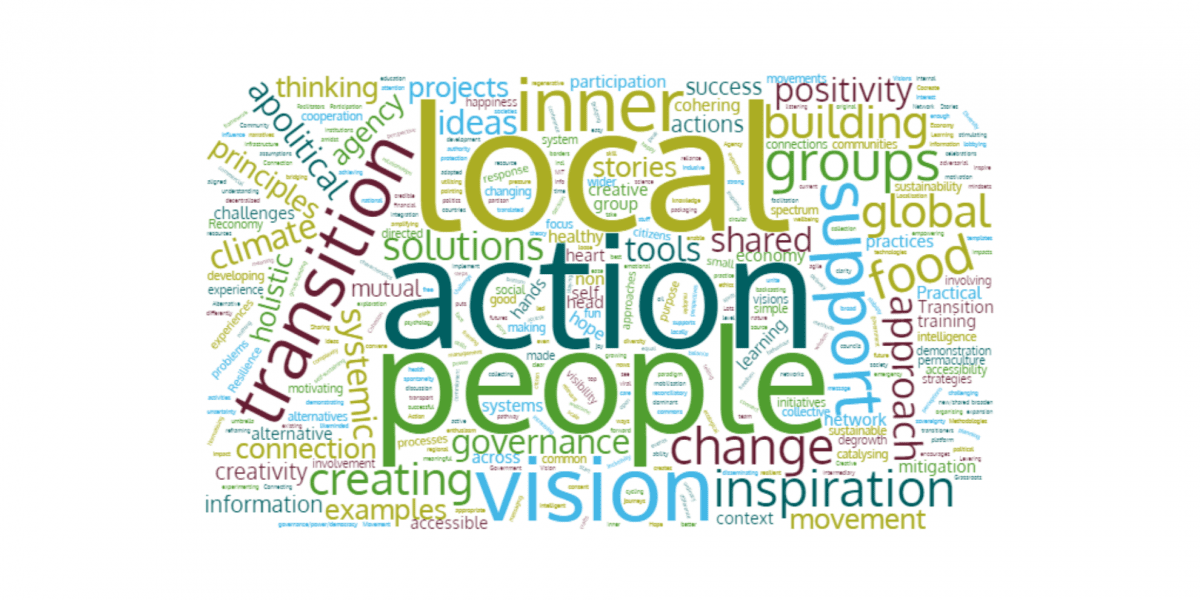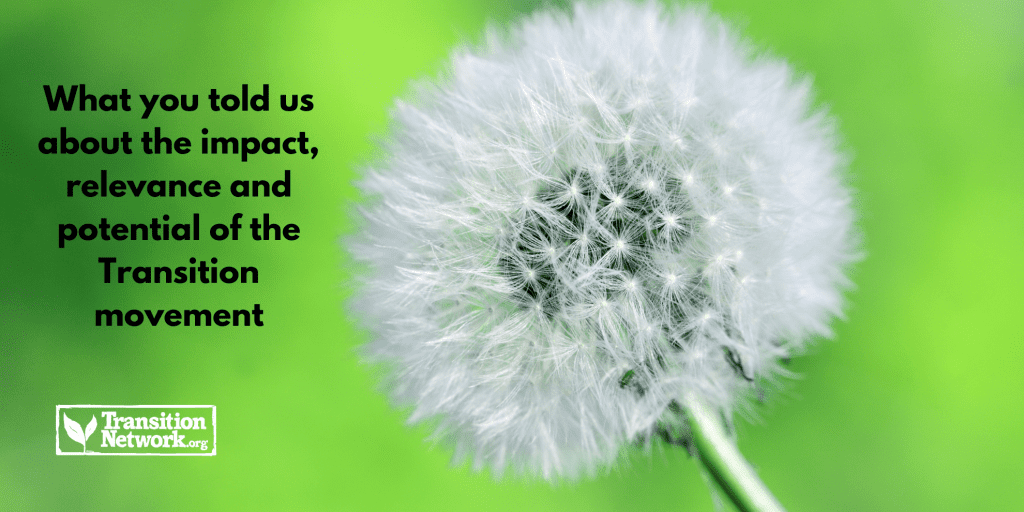What you told us about the impact, relevance and potential of the Transition movement
By Sarah McAdam 12th March 2021
Transition Network, working with the international network of Transition Hubs, is currently supporting a collective evaluation for, and about, the Transition movement. You can read about why we’re doing this work in a blog published last October here.
A central element of the evaluation was a survey, translated into 9 languages, which was completed by 377 people in 32 countries. The people who participated in the survey (most of whom are involved in a Transition group) have shared fascinating stories, examples and opinions. It feels important that Transition Network doesn’t hold onto this information and try to make sense and make use of it on our own. Instead, we are publishing our analysis as it currently stands and inviting you to explore it for yourself and give further feedback.
We hope you will find inspiration and support in the words of other Transitioners. You might come across experiences of Transition groups that could be applied or adapted in your own neighbourhood. Maybe this evidence of the impact and potential of the Transition movement will help you secure funding for a local project or influence your municipality. We encourage you to read with an open heart and mind and see what possibilities, feelings and further questions arise.
We are publishing our current analysis of the survey responses in two parts.
Impact of the Transition movement
Here you will find tables and stories showing how people assess the impact of their Transition group. We understand that there are limitations to self-assessment, but it is revealing to see where people feel they are having the greatest impact and the areas where groups have either not focused much attention or are struggling to make progress. We know that the work done by Transition groups often brings multiple benefits, sometimes in ways which are unpredictable and difficult to measure. It’s also our experience that Transition groups tend to forget or underestimate their achievements in their focus on the bigger changes that we are all longing for.
Given all of the above, it’s great to see reports of positive impacts across such a wide range of activities. In celebrating this, we don’t want to minimise or ignore the challenges that many people are also reporting. Throughout the survey responses, there are references to burnout, an over-reliance on small groups of volunteers and the emotional as well as the practical impacts of the times we are living in and our fears about the future. The importance of taking good care of ourselves and each other is evident throughout the survey responses – perhaps an appropriate point for us to link to the updated personal resilience resources we published recently.
The main part of this impact analysis document provides specific examples and quotes relating to each of the characteristics of the Transition movement that we shared in draft when we launched the evaluation process. We are using the evaluation process to test the draft characteristics and can already see a need to make some adjustments in the light of the feedback and new insights received. As we update the characteristics we will share them here and explain the reasons behind the changes, continuing to invite your comments and questions.
Transition as an emergency response
There were some particularly interesting answers to the survey question “In the face of recent challenges and crises e.g. Covid 19, political unrest and extreme weather events, has your Transition work had a significant impact in your local community or more widely?”. You can find our analysis of these responses in the last section of the impacts report.
The majority of respondents seem to have found an opportunity to continue some aspects of their work during the Covid-19 pandemic, with community food, nature connection projects, mutual aid, community cohesion and supporting local businesses the main impacts. Activities which relied on face to face events were negatively impacted, but where groups transferred this aspect of their work online, it proved an opportunity to broaden the group’s reach. Other groups took the opportunity to update or overhaul some of their work. Most significantly from our perspective, there was evidence that the social networks, social capital and skills that groups had built up over the years proved valuable at times of crisis. This contribution to community resilience and emergency preparedness feels like an important element of the Transition movement narrative – one which it can be helpful to emphasise when trying to secure resources or support for our work.
Relevance and Potential
In this document you will find our analysis of responses to the questions in the Relevance and Potential sections of the survey. We chose to ask open questions so that people could answer them in a way which felt meaningful to them. The result is a multiplicity of perspectives from across our movement, with some areas of significant alignment and others where there is a lot of divergence.
We received careful, passionate and expansive responses to some important questions for our movement. We encourage you to read the detail and notice your reactions. What feels familiar, maybe even boring or frustrating, and which comments feel exciting or different and perhaps spark new ideas.

Worldviews and expectations of the future
We didn’t ask specific questions about how people view the times in which we are currently living or their expectations of the future, but we caught glimpses of related assumptions, questions and emotions in many of the responses. In a Transition Network event last year, we used a regenerative spiral model developed by Resilience Earth to explore people’s worldviews and how these influence the way we think and feel about possible futures. As an experiment, we have included a section in the relevance and potential report highlighting survey responses which speak to each of these possible futures.
As we continue with the evaluation process, Transition Network would like to find skilful and accessible ways to help people identify and speak about their worldviews and expectations of the future when they come together as a group. It is our experience that, when such assumptions and feelings are left unnamed and unexplored, they can derail conversations and cause frustration and confusion. Our worldviews may impose unconscious limitations in how we think, feel and design, or they can create space for huge creativity and flexibility. Becoming aware of our worldviews and being willing to work with them, or even step outside them, can open up interesting new realms of possibility. We see this as a particularly important issue for the Transition movement since positive stories of what is possible are such a central part of our narrative and yet it’s also important that we don’t override feelings of despair or ignore the devastating impacts that the current system is already having on so many communities and on the natural world of which we are part.
Any assessment of the relevance and potential of the Transition movement requires us to look with a clear eye at the accelerating and interlinked global crises that we face. And, as human beings with complex responses to that complexity, we will need support and good tools and practices to help us stay grounded and find good next steps together.
What next?
In the final section of the relevance and potential report, we draw out themes, questions and, in some cases, tensions that we see arising from the survey responses. Transition Network plans to work with the Hubs Group to support and connect further collective conversations around some of these themes. Watch this space for more information as our plans develop.
We would really welcome your questions and feedback about the analysis and information shared in this blog. Transition Network wants to make this evaluation process open and interactive so that we benefit from the wealth of knowledge available across our movement and others can make use of the information we have gathered without waiting for our conclusions. We want to carry out further analysis (and, indeed, we are open to offers from researchers who might be interested in supporting this process). As we move into the next phase, now is a good opportunity to let us know if you have a different perspective on the data we are sharing here or see interesting possibilities for deeper collective reflection about the impact, relevance and potential of our movement.
You can add comments at the bottom of this blog, interact with us on social media or email the evaluation team at evaluation(at)transitionnetwork.org.
DOWNLOAD:
Transition movement evaluation survey overview – impacts
Transition movement evaluation survey overview – relevance & potential

2 Comments
Thanks very nice blog!
I’m very excited to see the depth of this collective self-questioning. I think it’s the first time I’ve ever seen such honesty, rigour and (re)inventivity at a collective level.
What if…..governments and corporations invested some of their R&D money into this kind of self-questioning, instead of into lobbying to continue pulverising biodiversity out of existence because they’re afraid of looking reality in the face!!!???!!! Hmmm, wouldn’t that be nice! Warning to anyone hanging on to old oil-age habits! The kind of creativity manifested by this collective evaluation may just be more contagious than certain infamous viruses! The times they are a’changin!